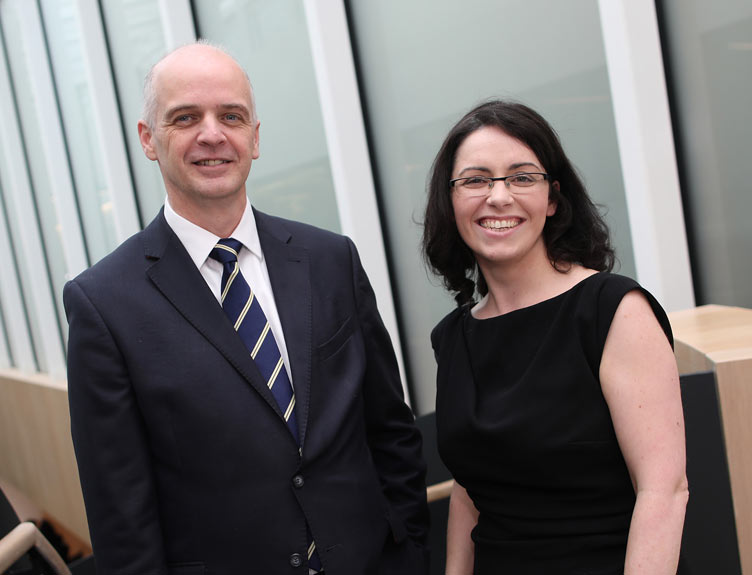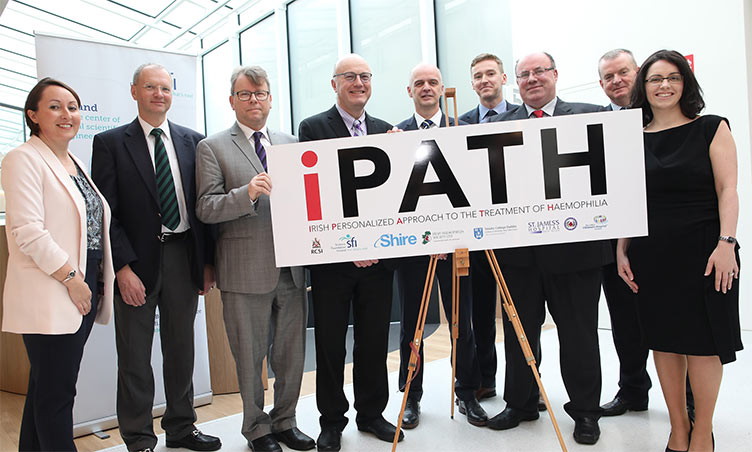Ground-breaking €4m haemophilia study launched

RCSI, Science Foundation Ireland (SFI) and Shire, in partnership with the Irish Haemophilia Society, will today jointly announce a major new €4 million, patient-orientated study entitled 'The Irish Personalised Approach to the Treatment of Haemophilia (iPATH)'. Haemophilia is a genetic disorder that predominantly affects men, with approximately 1 in 3.000 males in Ireland affected.
This study will develop new and innovative approaches to improve the clinical care of patients with the inherited bleeding disorder haemophilia. Currently, patients with haemophilia are given the same standardised treatments. The iPATH study seeks to revolutionise the current ‘one size fits all' global standard of treatment that has been in place for more than fifty years and develop a new personalised treatment approach that will tailor treatments based on the needs of the individual patient.
This ground-breaking study, led by Professor James O' Donnell, Director of the Irish Centre for Vascular Biology, RCSI and a Consultant Haematologist in the National Coagulation Centre in St James' Hospital, Dublin, will establish Ireland as a world leader in the development of personalised medicine for patients with bleeding disorders.
"Over the past 30 years, the principal focus of physicians engaged in caring for patients with haemophilia has been to ensure that our treatments are effective, safe and, in particular, free from viral contamination," said Professor O' Donnell. "In order to enhance quality of life for people with haemophilia in the future, we need to begin developing innovative treatment strategies that can be tailored specifically according to the needs of each individual patient. To achieve this objective, we first need to understand the biological mechanisms that underpin the marked differences in bleeding risks and long term complications that exist between individual patients with haemophilia. By explaining these mechanisms, the iPATH study will pave the way for the introduction of personalised medicine for patients with haemophilia"
The four year iPATH programme is open to all Irish children and adults with moderate or severe haemophilia. The study is supported by an SFI Strategic Partnership initiative and involves scientific researchers in RCSI, Trinity College Dublin (TCD) and Shire who hold a strong and established presence in Ireland. The iPATH partnership also includes the Irish Haemophilia Society, and clinical researchers based in St James's Hospital Dublin, Our Lady's Children's Hospital Crumlin, Cork University Hospital and University Hospital Galway.
A major strength of the iPATH partnership is that, for the first time, leading Irish investigators will work in collaboration with the world class clinical and scientific investigators from Shire.

Pictured (L-R): Ms Noelle Costelloe, Programme Manager for iPATH and Irish Centre for Vascular Biology, RCSI; Dr Peter Turecek, Senior Director, Global Medical Affairs, Shire; Mr Brian O’Mahony, Chief Executive of the Irish Haemophilia Society; Professor Mark Ferguson, Director General of Science Foundation Ireland and Chief Scientific Adviser to the Government of Ireland; Professor James O’ Donnell, Director of the Irish Centre for Vascular Biology, RCSI and Consultant Haematologist in the National Coagulation Centre in St James’ Hospital, Dublin; Dr Roger Preston, Principal Investigator iPATH, Irish Centre for Vascular Biology, RCSI; Professor Padraic Fallon Principal Investigator iPATH, Professor of Translational Immunology, TCD; Dr John Gormley, Principal Investigator iPATH, Discipline of Physiotherapy, School of Medicine TCD; Dr Michelle Lavin, Principal Investigator iPATH, Clinical Research Fellow, Irish Centre for Vascular Biology, RCSI and St James’s Hospital Dublin
"To improve standards of care for people with haemophilia we need to combine innovation with personalisation to optimise treatment outcomes," said Peter Turecek, Senior Director, Global Medical Affairs, Shire. "Shire is committed to driving innovation and advancing standards of care in haemophilia. By investing in iPATH, we hope to uncover new solutions that build on and maximise the value of factor therapy and further personalise care for haemophilia patients."
Commenting on the announcement, Director General of Science Foundation Ireland and Chief Scientific Adviser to the Government of Ireland, Professor Mark Ferguson, said: "I am delighted to announce this international collaboration between RCSI, Science Foundation Ireland and Shire. The iPATH partnership combines the best expertise from industry and academia to improve treatment options and outcomes for patients with haemophilia worldwide. Science Foundation Ireland are committed to supporting collaborations such as these, which can significantly improve our health care services and create impactful research outcomes."
"The future of haemophilia care has to be based on a personalised approach to treatment. We fully expect this exciting, innovative and collaborative research programme to provide us with the answers required to optimise every aspect of future treatment for each individual with haemophilia in Ireland and to achieve results which may well be of global importance," stated Brian O'Mahony, Chief Executive of the Irish Haemophilia Society.
Director of Research and Innovation at RCSI, Professor Ray Stallings, welcomed the announcement saying "RCSI is delighted to announce this new collaboration in partnership with SFI and Shire. At RCSI we have a strong focus on translating scientific research into new diagnostics and treatments for the benefit of patients and healthcare systems. This partnership exemplifies how collaboration between academia and industry can help improve the health of people with haemophilia through high quality, impactful scientific research."
About RCSI
RCSI is ranked among the top 250 (top 2%) of universities worldwide in the Times Higher Education World University Rankings (2018) and its research is ranked first in Ireland for citations. It is an international not-for-profit health sciences institution, with its headquarters in Dublin, focused on education and research to drive improvements in human health worldwide. RCSI is a signatory of the Athena SWAN Charter.
About Science Foundation Ireland
Science Foundation Ireland funds oriented basic and applied research in the areas of science, technology, engineering, and mathematics (STEM) which promotes and assists the development and competitiveness of industry, enterprise and employment in Ireland. The Foundation also promotes and supports the study of and engagement with STEM and promotes an awareness and understanding of the value of STEM to society and, in particular, to the growth of the economy. See ScienceFoundationIreland.ie.
Science Foundation Ireland has launched the #BelieveInScience campaign to promote the potential that science and discovery offer Ireland, today and in tomorrow's world. The #BelieveInScience campaign will see Science Foundation Ireland work in partnership with the Irish research community to share a mutual passion for science with the public; to promote an understanding of the ability of science, technology, engineering and maths (STEM) to create positive change in the world and to drive a sustainable economy in Ireland.
About Shire
Shire is the leading global biotechnology company focused on serving people with rare diseases and other highly specialised conditions. We strive to develop best-in-class products, many of which are available in more than 100 countries, across core therapeutic areas including Haematology, Immunology, Neuroscience, Ophthalmics, Lysosomal Storage Disorders, Gastrointestinal / Internal Medicine / Endocrine and Hereditary Angioedema; and a growing franchise in Oncology.
Our employees come to work every day with a shared mission: to develop and deliver breakthrough therapies for the hundreds of millions of people in the world affected by rare diseases and other high-need conditions, and who lack effective therapies to live their lives to the fullest.



